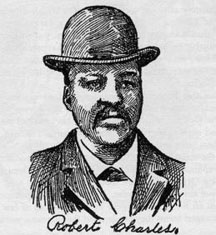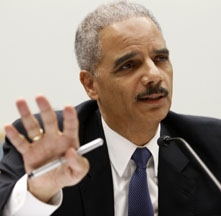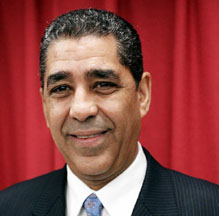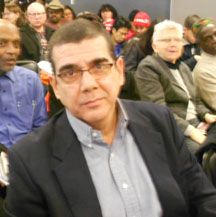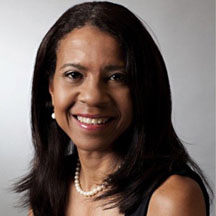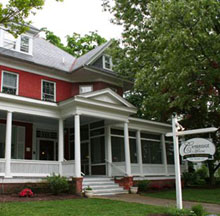If Opening From an E-mail,
Click Here for Better Viewing
January 19 – February 1, 2017
On The Dock This Issue:
 |
Black Men Who Used Guns to Solve America’s Race Problem – Part III of III The African American community celebrated the story of Robert Charles. He was a Black man who stood up and fought back. | |
|---|---|---|
| Don’t Mourn. Organize. The chairman of the CBC said, we "may just have to kick somebody's ass.” |
||
| Largest Congressional Black Caucus Takes Shape With Kamala Harris, there are now three Blacks in the 100 seat Senate – the first time the U.S. Senate has had three sitting Black senators. |
||
| Fidel Castro Tribute Filled to Capacity Before Castro, the world knew Cuba for “gambling, hookers, and drugs.” |
||
| Andrea Young to Head Georgia ACLU Young served for many years as the executive director of the Andrew J. Young Foundation. |
||
| Bed and Breakfast on The Underground Railroad The website extols 25 former safehouses verified by intact oral or written histories. |
||
| Activities Interesting, diverse things to do |
||
| Readers' Trends Port Of Harlem, Pinterest, and Facebook. |
Looking back from 1900 to 2011, The New Orleans Picayune Newspaper called the bullet-spattered collision between Robert Charles and the New Orleans Police Department "one of the bloodiest episodes of the Jim Crow era." The newspaper recounted "that the confrontation between a Black man and White police officers in July 1900 soon escalated into a shootout."
The Black man was Robert Charles, a young man who was born in Woodville, Mississippi in 1865 or 1866, and moved to the "Big Easy" in 1894. Perhaps it has never been the legendary Big Easy for Black folks; it certainly was not then. The Supreme Court-sanctioned American apartheid via Plessy vs. Ferguson strolled arm-in-arm with a state constitution that robbed many in Louisiana of their right to vote. And, the law of the rope and torch was regularly visited on innocent Black people all across the country, including Louisiana.
To support himself, Charles hustled at odd jobs. He soon began to sell subscriptions to a Black newspaper as well as shares in a company that helped Blacks "go back to Africa," as migrants to Liberia.
Charles was so outraged at the tide of everyday racist violence and indignities that African Americans endured in the city that a smoldering resentment began to slowly grow inside him. As a result, he bought a gun to protect himself.
The confrontation with the police began on the front porch of a home at 2815 Dryads Street on July 23, 1900 and led to the deaths of at least 13 people, several days of rioting, and random assaults on Black people, including several who were snatched off city streetcars and shot. The Crescent City's best known African American school was burned to the ground.
Charles and a friend Leonard Pierce were covering on the stoop when they were confronted by a group of police who demanded to know their business at that location. Even though Charles and Pierce were breaking no laws, one of the policemen raised his club to strike Charles.
Charles stood up to defend himself. Both sides drew guns. They fired shots. At least one White man wounded Charles, but Charles got away. According to a chronology prepared by the Louisiana State University (LSU) Library, Charles shot three policemen, killing two of them.
The next day, Whites unleashed a wave of fury against the Black community. On July 25th, Whites killed three innocent Blacks, five Whites were hospitalized, and over four dozen people were hurt. There are reports that the police were ordered to kill Charles on sight.
On July 27, 1900, there was a final gun battle between Charles and the police. The LSU timeline indicates that the "deadly clash" took place at 1208 Saratoga Street and resulted in the death of Charles "after he kills seven men and injures twenty-seven."
Police counted 30 bullet holes in Charles' body. White newspapers had already begun calling him a "negro fiend." In the meantime, the mayor had sworn in a "citizen police" force of some 1,500 White men, many of whom terrorized local African Americans. At least five Blacks were killed by mobs.
The Black man was Robert Charles, a young man who was born in Woodville, Mississippi in 1865 or 1866, and moved to the "Big Easy" in 1894. Perhaps it has never been the legendary Big Easy for Black folks; it certainly was not then. The Supreme Court-sanctioned American apartheid via Plessy vs. Ferguson strolled arm-in-arm with a state constitution that robbed many in Louisiana of their right to vote. And, the law of the rope and torch was regularly visited on innocent Black people all across the country, including Louisiana.
To support himself, Charles hustled at odd jobs. He soon began to sell subscriptions to a Black newspaper as well as shares in a company that helped Blacks "go back to Africa," as migrants to Liberia.
Charles was so outraged at the tide of everyday racist violence and indignities that African Americans endured in the city that a smoldering resentment began to slowly grow inside him. As a result, he bought a gun to protect himself.
The confrontation with the police began on the front porch of a home at 2815 Dryads Street on July 23, 1900 and led to the deaths of at least 13 people, several days of rioting, and random assaults on Black people, including several who were snatched off city streetcars and shot. The Crescent City's best known African American school was burned to the ground.
Charles and a friend Leonard Pierce were covering on the stoop when they were confronted by a group of police who demanded to know their business at that location. Even though Charles and Pierce were breaking no laws, one of the policemen raised his club to strike Charles.
Charles stood up to defend himself. Both sides drew guns. They fired shots. At least one White man wounded Charles, but Charles got away. According to a chronology prepared by the Louisiana State University (LSU) Library, Charles shot three policemen, killing two of them.
The next day, Whites unleashed a wave of fury against the Black community. On July 25th, Whites killed three innocent Blacks, five Whites were hospitalized, and over four dozen people were hurt. There are reports that the police were ordered to kill Charles on sight.
On July 27, 1900, there was a final gun battle between Charles and the police. The LSU timeline indicates that the "deadly clash" took place at 1208 Saratoga Street and resulted in the death of Charles "after he kills seven men and injures twenty-seven."
Police counted 30 bullet holes in Charles' body. White newspapers had already begun calling him a "negro fiend." In the meantime, the mayor had sworn in a "citizen police" force of some 1,500 White men, many of whom terrorized local African Americans. At least five Blacks were killed by mobs.
What is likely is that in this current superheated racial climate, the chance of other African American veterans, and indeed civilians, grabbing a gun to solve America's founding problem remains high.
The African American community celebrated the story of Robert Charles. He was a Black man who stood up and fought back. His courage and the unerring deadliness of his Winchester rifle were the marrow of song and legend.
In "Mob Rule in New Orleans: The Story of Robert Charles," the anti-lynching activist Ida B. Wells wrote: "the White people of this country may charge that he was a desperado but to the people of his own race Robert Charles will always be regarded as the hero of New Orleans."
The stories of five Black men have been chronicled in this series and their actions stretch back over a century. And whatever else you may think of them, it is clear that American racism, both institutional and interpersonal, was a significant causative factor in each man's turn to armed resistance.
Equally certain is that at least some of these men suffered a variety of illnesses, some diagnosed or later connected to their military service. Gavin Long told his friends that he suffered from PTSD and had prescriptions for Valium, the sleep aid Lunesta, and the anti-anxiety medication Ativan. There are studies that indicate that African American soldiers, both male and female, suffer from higher rates of PTSD than White soldiers.
In addition, Chad Williams of Brandeis University has posed the question of how did serving in Iraq and Afghanistan, and then seeing videos of police killing unarmed African Americans, possibly affect Long and Johnson's respective psyches? Both men may or may not have served in combat, but they would not have been immune from the psychological traumas of being Black soldiers and the need to make sense of their conflicted identities at a time of heightened racial tensions.
Were Johnson's alleged moroseness and mental instability and Long's attempts at self-medication symptoms of deeper, underlying issues that could have or should have been dealt with earlier and perhaps with greater success? Did the same or similar issues plague Dorner, Essex, or even Charles? We will never know. What is likely is that in this current superheated racial climate, the chance of other African American veterans, and indeed civilians, grabbing a gun to solve America's founding problem remains high.
Black Men Who Used Guns to Solve America’s Race Problem – Part I of III Barely mentioned was Johnson's receipt of several awards, for example, "honorable active military service" and "meritorious achievement or service."
Black Men Who Used Guns to Solve America’s Race Problem – Part II of III
"He knows what he's doing," Charlie Beck, the head of the LAPD, told reporters while the shooter was at large. "We trained him."
California Organizes for the Big and Small Fights - Girding for four years of potential battles with President-elect Donald J. Trump, Democratic leaders of the California Legislature announced that they hired Eric H. Holder Jr., who was attorney general under President Obama, to represent them in any legal fights against the new Republican White House.
“Having the former attorney general of the United States brings us a lot of firepower in order to prepare to safeguard the values of the people of California,” Kevin de León, the Democratic leader of the Senate, said in an interview. “This means we are very, very serious.”
The move by Mr. de León and his Democratic counterpart in the Assembly, Anthony Rendon, follows Gov. Jerry Brown’s appointment of Representative Xavier Becerra as attorney general last month, to succeed Kamala D. Harris, who was elected to the United States Senate.
That appointment made Mr. Becerra one of the highest-ranking Latino officials in this state, and he is expected to be instrumental in battling with the Trump White House over any attempt to enforce stringent measures aimed at immigrants. Mr. Brown has made clear that he intends to challenge the administration on global warming and that his attorney general will be a key to that battle.
The Democratic Party controls two-thirds of both the Assembly and the Senate in California. Every statewide elected official is a Democrat. Read More in the NY Times
Modern Day Underground Railroad Safehouses - PICO National Network, United We Dream, and Church World Service are taking a prophetic stance against President-elect Trump’s promised persecution of immigrants, Muslims, and people of color by providing Sanctuary in more than 800 congregations. Dial “SANCTUARY” to 228466 to be alerted to both national and local opportunities to stand with our vulnerable sisters and brothers this year and forever.
“Having the former attorney general of the United States brings us a lot of firepower in order to prepare to safeguard the values of the people of California,” Kevin de León, the Democratic leader of the Senate, said in an interview. “This means we are very, very serious.”
The move by Mr. de León and his Democratic counterpart in the Assembly, Anthony Rendon, follows Gov. Jerry Brown’s appointment of Representative Xavier Becerra as attorney general last month, to succeed Kamala D. Harris, who was elected to the United States Senate.
That appointment made Mr. Becerra one of the highest-ranking Latino officials in this state, and he is expected to be instrumental in battling with the Trump White House over any attempt to enforce stringent measures aimed at immigrants. Mr. Brown has made clear that he intends to challenge the administration on global warming and that his attorney general will be a key to that battle.
The Democratic Party controls two-thirds of both the Assembly and the Senate in California. Every statewide elected official is a Democrat. Read More in the NY Times
Modern Day Underground Railroad Safehouses - PICO National Network, United We Dream, and Church World Service are taking a prophetic stance against President-elect Trump’s promised persecution of immigrants, Muslims, and people of color by providing Sanctuary in more than 800 congregations. Dial “SANCTUARY” to 228466 to be alerted to both national and local opportunities to stand with our vulnerable sisters and brothers this year and forever.
Congressional Black Caucus (CBC) Gets Its Groove Back - Sen. Cory Booker (D-N.J.) became the first sitting senator to testify against a fellow senator’s nomination for a Cabinet post when he testified against Sen. Jeff Sessions (R-AL.) as attorney general. The former mayor of Newark told the Washington Post, “To remain silent at this time, to me, is unacceptable. Even if it means breaking norms on issues of this kind of gravity, I could not have sat well with my own self to remain silent on issues that are the core of our conceptions of justice.” He continued, “Silence would be tantamount to complicity.”
Rep. Cedric Richmond (D-La.), chairman of the CBC said, we "may just have to kick somebody's ass,” after discovering the Republicans removed an award winning painting they did not like. A St. Louis area high school student created the image of police officers with animal heads pointing guns at Blacks. Rep. Lacy Clay (D-MO) filed a police report, but the U.S. Capitol Police, which did not like the painting and applauded the removal, refused to take the complaint. See painting.
Earlier this year, Rep Maxine Waters said she has no plan to meet with Trump, even if invited. “This business of calling names and lying, retreating on your promises, etc. Why should I trust him to be any different with me.”
Rep. Cedric Richmond (D-La.), chairman of the CBC said, we "may just have to kick somebody's ass,” after discovering the Republicans removed an award winning painting they did not like. A St. Louis area high school student created the image of police officers with animal heads pointing guns at Blacks. Rep. Lacy Clay (D-MO) filed a police report, but the U.S. Capitol Police, which did not like the painting and applauded the removal, refused to take the complaint. See painting.
Earlier this year, Rep Maxine Waters said she has no plan to meet with Trump, even if invited. “This business of calling names and lying, retreating on your promises, etc. Why should I trust him to be any different with me.”
Musical Resistance
The Takoma Ensemble
(classical string orchestra)
The Golden Door: Music Without Borders
(in response to Trump’s closed borders)
Episcopal Church of the Ascension
633 Sligo Ave
Silver Spring
Sat, Jan 21,7:30p, $10-$25
The 115th Congress is comprised of 49 Congressional Black Caucus (CBC) members, the largest in CBC history. Representative Cedric L. Richmond succeeds Representative G. K. Butterfield as the 25th Chair of the CBC.
The new members joining the CBC are: Senator Kamala Harris, California; and Representatives Lisa Blunt Rochester, Delaware; Anthony Brown, Maryland; Val Demmings, Florida; Al Lawson, Florida; and Donald McEachin, Virginia.
The new members joining the CBC are: Senator Kamala Harris, California; and Representatives Lisa Blunt Rochester, Delaware; Anthony Brown, Maryland; Val Demmings, Florida; Al Lawson, Florida; and Donald McEachin, Virginia.
With Harris, there are now three Blacks in the 100 seat Senate – the first time the U.S. Senate has had three sitting Black senators.
Some members of African descent have chosen not to join the CBC including Senator Tim Scott, South Carolina; and Representatives Will Hurd, Texas; and Adriano Espaillat, New York, American’s first Dominican-American congressperson.
Some members of African descent have chosen not to join the CBC including Senator Tim Scott, South Carolina; and Representatives Will Hurd, Texas; and Adriano Espaillat, New York, American’s first Dominican-American congressperson.
Event organizer Gnaka Lagoke opened “Cuba, Africa, & the World: A Tribute to Fidel Castro” to a full house of over 140 people on a very cold Saturday, January 7 afternoon. Participants included people from as far north as New York, west as Chicago, and south as Richmond, VA. Two brothers of former Burkina Faso President Thomas Sankara, Pascal and Paul, joined the celebration of Castro’s life.
The Cuban Ambassador the United States talked about Castro’s accomplishments personally and officially. On his solidarity with African people, at home and abroad, Ambassador Jose Cabana said, “Africa is not something else. We are Africans.”
After visiting the new National Museum of African American History and Culture in Washington, Cabana, who because of the Cuban Revolution was the first in his family to attend college, added “We went through the same history.”
The Cuban Ambassador the United States talked about Castro’s accomplishments personally and officially. On his solidarity with African people, at home and abroad, Ambassador Jose Cabana said, “Africa is not something else. We are Africans.”
After visiting the new National Museum of African American History and Culture in Washington, Cabana, who because of the Cuban Revolution was the first in his family to attend college, added “We went through the same history.”
“Fidel changed Cuba from a banana republic to a nation,” surmised Jose Pertierra, a Cuban-American lawyer, who represented the father of Elián González. Before Castro, the world knew Cuba for “gambling, hookers, and drugs,” he said. Now, the world knows the island nation for its doctors and life saving drugs, he continued.
Jennifer Bryant of Venceremos Brigade and Cooperation DC recalled four things she learned from traveling to Cuba: 1) study 2) sacrifice 3) solidarity, and 4) staying the course. The Howard University graduate added, “Cuba filled me with hope for the future.”
Though the crowd acknowledged that President Obama has opened the doors to better relations with our Cuban cousins, the crowd enthusiastically agreed with one participant who said the new task include ending the embargo and returning Quantomoa, which is about twice the size of Manhattan, back to Cuba.
Other interesting tidbits from the event:
Pathfinder Books - 7603 Georgia Avenue, NW Suite 300
Trips to Cuba: Sadiki Educational Safari, April 17 – April 23, 2017, contact Ms. Curtis at sadikisafari@gmail.com
Jennifer Bryant of Venceremos Brigade and Cooperation DC recalled four things she learned from traveling to Cuba: 1) study 2) sacrifice 3) solidarity, and 4) staying the course. The Howard University graduate added, “Cuba filled me with hope for the future.”
Though the crowd acknowledged that President Obama has opened the doors to better relations with our Cuban cousins, the crowd enthusiastically agreed with one participant who said the new task include ending the embargo and returning Quantomoa, which is about twice the size of Manhattan, back to Cuba.
Other interesting tidbits from the event:
Pathfinder Books - 7603 Georgia Avenue, NW Suite 300
Trips to Cuba: Sadiki Educational Safari, April 17 – April 23, 2017, contact Ms. Curtis at sadikisafari@gmail.com
Lifelong civil rights activist and Georgia native Andrea Young became the new executive director of the American Civil Liberties Union of Georgia on January 1. Young served for many years as the executive director of the Andrew J. Young Foundation, where she worked to preserve and advance the legacy of her father, a former Atlanta mayor, civil rights leader, U.S. Congressman, and U.S. Ambassador to the United Nations.
“As a lifelong civil rights activist and proud Georgia native, I am deeply honored to lead the ACLU of Georgia at this important time,” said Young. “From protecting the right to vote and women’s reproductive freedom to defending the rights of LGBT Georgians and standing with our immigrant neighbors, the work of the ACLU is more important than ever before.”
“As a lifelong civil rights activist and proud Georgia native, I am deeply honored to lead the ACLU of Georgia at this important time,” said Young. “From protecting the right to vote and women’s reproductive freedom to defending the rights of LGBT Georgians and standing with our immigrant neighbors, the work of the ACLU is more important than ever before.”
In addition to her work with the Foundation, Young previously worked as a legislative assistant to Sen. Edward Kennedy and as chief of staff for the first woman to represent Georgia in Congress, Rep. Cynthia McKinney. She also served with the United Church of Christ in global mission and advocacy, and she has held executive positions for Planned Parenthood of Metropolitan Washington, the National Black Child Development Institute, and the Southern Education Foundation.
Young holds degrees from the Georgetown University Law Center and Swarthmore College. She also worked as Adjunct Professor at the Andrew Young School of Policy Studies at Georgia State University
.
Young holds degrees from the Georgetown University Law Center and Swarthmore College. She also worked as Adjunct Professor at the Andrew Young School of Policy Studies at Georgia State University
.
Among the ways bedandbreakfast.com categorizes its member B&Bs - - kid friendly, bargains, haunted, pets OK, etc. - - is by inns with Underground Railroad history. The website extols 25 former safehouses verified by intact oral or written histories. Safehouses or stations were places along the route the enslaved used to escape from the South to the North.
We've added one more we know of, Gettysburg, Pennsylvania's Dobbin House. Here are the 26 listed alphabetically by state.
Click here for the current issue of the Underground Railroad Free Press.
Amelia Island Williams House
Fernandina Beach, Florida
1852 Hall Place Bed & Breakfast
Glasgow, Kentucky
Bradford House B&B
Patton, Maine
Cambridge House B&B
Cambridge, Maryland
Ashley Manor on Cape Cod
Barnstable, Massachusetts
Tern Inn
West Harwich, Massachusetts
We've added one more we know of, Gettysburg, Pennsylvania's Dobbin House. Here are the 26 listed alphabetically by state.
Click here for the current issue of the Underground Railroad Free Press.
Amelia Island Williams House
Fernandina Beach, Florida
1852 Hall Place Bed & Breakfast
Glasgow, Kentucky
Bradford House B&B
Patton, Maine
Cambridge House B&B
Cambridge, Maryland
Ashley Manor on Cape Cod
Barnstable, Massachusetts
Tern Inn
West Harwich, Massachusetts
Munro House B&B and Spa
Jonesville, Michigan
The Steamboat House
Galena, Illinois
The Inn at Aberdeen
Valparaiso, Indiana
Mason House Inn
Bentonsport, Iowa
Whispering Pines Bed & Breakfast
Nebraska City, Nebraska
Halcyon Farm Bed & Breakfast
Amsterdam, New York
Saratoga Farmstead B&B
Saratoga Springs, New York
1830 Hallauer House
Oberlin, Ohio
Six Acres Bed & Breakfast
Cincinnati, Ohio
Great Valley House of Valley Forge
Malvern, Pennsylvania
Speedwell Forge B&B
Lititz, Pennsylvania
Dobbin House
Gettysburg, Pennsylvania
Previously reviewed in Free Press
The Fairfield Inn
Fairfield, Pennsylvania
Previously reviewed in Free Press
Golden Stage Inn B&B
Proctorsville, Vermont
Hamilton House B&B
Whitewater, Wisconsin
Jonesville, Michigan
The Steamboat House
Galena, Illinois
The Inn at Aberdeen
Valparaiso, Indiana
Mason House Inn
Bentonsport, Iowa
Whispering Pines Bed & Breakfast
Nebraska City, Nebraska
Halcyon Farm Bed & Breakfast
Amsterdam, New York
Saratoga Farmstead B&B
Saratoga Springs, New York
1830 Hallauer House
Oberlin, Ohio
Six Acres Bed & Breakfast
Cincinnati, Ohio
Great Valley House of Valley Forge
Malvern, Pennsylvania
Speedwell Forge B&B
Lititz, Pennsylvania
Dobbin House
Gettysburg, Pennsylvania
Previously reviewed in Free Press
The Fairfield Inn
Fairfield, Pennsylvania
Previously reviewed in Free Press
Golden Stage Inn B&B
Proctorsville, Vermont
Hamilton House B&B
Whitewater, Wisconsin
Washington
The Hard Problem
Studio Theater
14th and P St, NW
now through Sun, Feb 19, $
Golden Minaret Awards Gala and Market
Diyanet Turkish Cultural Center
(Saluting 400+ Years of Muslim Service to America)
9704 Good Luck Road
Lanham, MD
Sat, Jan 21, 10a-10p, $
Black Georgetown Remembered
CR Gibbs
St. John's Church
Church of the Presidents
Lafayette Sq, NW
Wed, Feb 1, 7p, free
The Hard Problem
Studio Theater
14th and P St, NW
now through Sun, Feb 19, $
Golden Minaret Awards Gala and Market
Diyanet Turkish Cultural Center
(Saluting 400+ Years of Muslim Service to America)
9704 Good Luck Road
Lanham, MD
Sat, Jan 21, 10a-10p, $
Black Georgetown Remembered
CR Gibbs
St. John's Church
Church of the Presidents
Lafayette Sq, NW
Wed, Feb 1, 7p, free
Special Screening: I Am Not Your Negro
Ballou High School
3401 4th Street, SE
Wed, Feb 1, 6p, free
(in theaters Feb 3)
Baltimore
Stephen Towns' Take Me Away to the Stars Artist's Talk
Galerie Myrtis
2224 N Charles St
Sat, Jan 28, 3p-6p, free
Coming
Black Memorabilia Show
Reginald F. Lewis Museum
830 E Pratt Street
Baltimore
Sat, Feb 11, 10a-5p
The Gin Game
MetroStage
1201 N. Royal
Wed, Feb 1-Sun, Mar 12, $
Ballou High School
3401 4th Street, SE
Wed, Feb 1, 6p, free
(in theaters Feb 3)
Baltimore
Stephen Towns' Take Me Away to the Stars Artist's Talk
Galerie Myrtis
2224 N Charles St
Sat, Jan 28, 3p-6p, free
Coming
Black Memorabilia Show
Reginald F. Lewis Museum
830 E Pratt Street
Baltimore
Sat, Feb 11, 10a-5p
The Gin Game
MetroStage
1201 N. Royal
Wed, Feb 1-Sun, Mar 12, $
| From the Last Issue | On Pinterest | On Facebook | On Website | |||
|---|---|---|---|---|---|---|
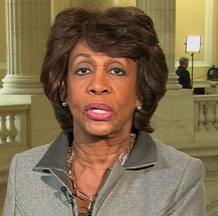 Don’t Mourn. Organize. |
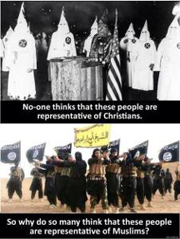 White Supremacists More Deadly than Jihadist (5th consecutive) |
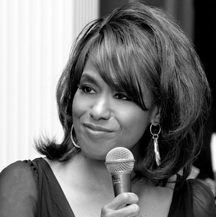 Holiday Tells Trump, "I am telling you, I'm not coming any where." | 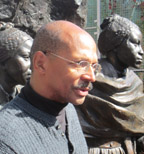 CR Gibbs |






